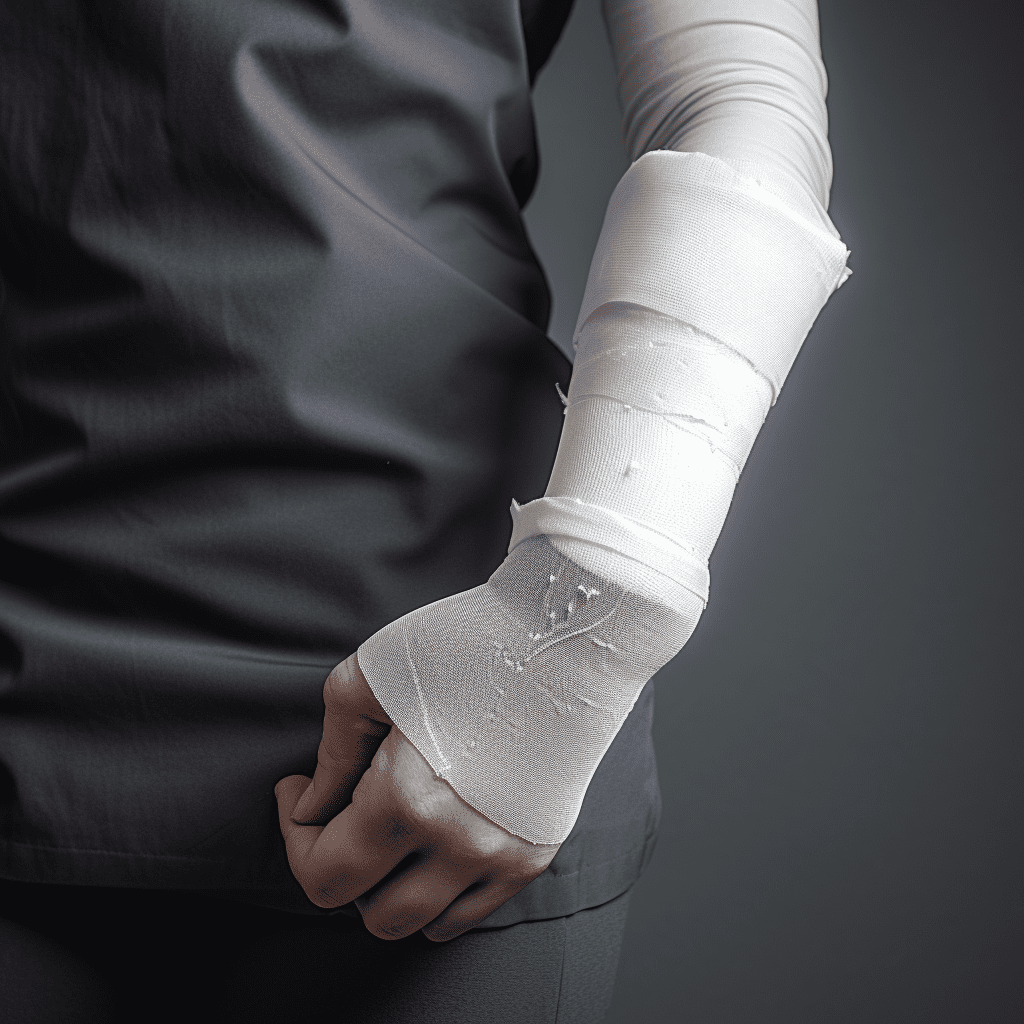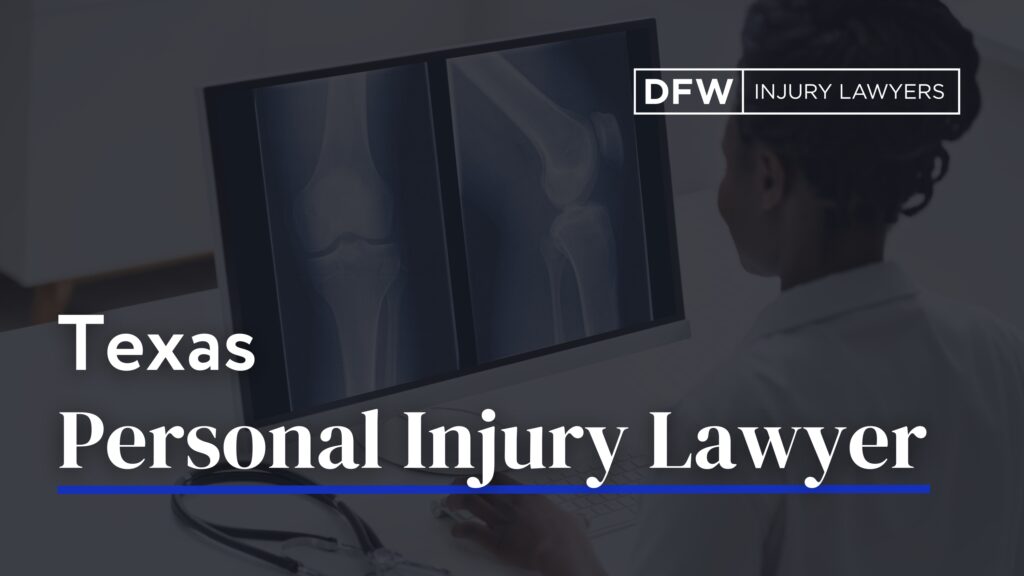Listen to an excerpt of this page

 Trusted Content
Trusted Content
If you’re hurt due to someone else’s negligence, the last thing you want to worry about is how you’ll pay for your medical bills. Thankfully, you have legal options to pursue compensation for your losses. After an accident, an experienced personal injury lawyer in Dallas, Texas can help you recover compensation for your medical expenses and any other losses you suffered because of the accident.
With DFW Injury Lawyers, our Dallas personal injury lawyers can help with every step of a personal injury claim, from the initial investigation to the courtroom.
Whether you need assistance with a car, Uber, truck, motorcycle, bike, or pedestrian accident injury, a slip and fall, a catastrophic injury, or a wrongful death claim, our lawyers have helped countless injured victims in Dallas get the justice they deserve.
Key Takeaways
- Personal injury law focuses on providing legal help to individuals who have sustained physical or emotional injuries due to someone else’s negligence.
- Having a knowledgeable and experienced Dallas personal injury lawyer can make all the difference.
- A Dallas personal injury lawyer can fight for your rights and get you the aggressive legal representation you need to win.
What is Personal Injury Law?
Personal injury law focuses on providing legal recourse for individuals who sustained physical or emotional injuries as a result of another person’s negligence or wrongful actions. In personal injury cases, the injured party may seek compensation for their damages, including medical expenses, lost wages, pain and suffering, and more.
Types of personal injury claims include:
- Motor vehicle accidents: Over 15,000 serious injury crashes occurred on Texas’s roadways in 2022, according to TxDOT. These claims typically involve negligence on the part of a driver and include car, truck, and motorcycle accidents.
- Wrongful death: Wrongful death cases occur when an individual’s negligence or intentional actions result in someone else’s death. After a Texas wrongful death, the surviving family members may file a claim seeking compensation for their loss.
- Product liability: When a defective or dangerous product causes harm, the victim may have a product liability claim against the product’s manufacturer or distributor. Examples include dangerous drugs and defective products.
- Premises liability: Premises liability claims arise when someone suffers injuries caused by unsafe conditions on someone else’s property. Examples include dog bites, inadequate security, or other dangerous conditions that cause harm.
- Slip and fall: Slip and falls cases cover injuries caused by slipping or tripping on someone else’s property because of a hazardous surface, like a wet floor, uneven pavement, or icy sidewalks.
- Workplace injuries: In some instances, workers injured on the job may qualify to file a personal injury lawsuit against a third party who contributed to their injuries and/or an employer who does not provide workers’ compensation insurance.

Filing a Personal Injury Lawsuit: The Numbers On Your Side
Having a knowledgeable and experienced Dallas personal injury lawyer by your side makes all the difference.
At DFW Injury Lawyers, our dedicated attorneys bring the muscle in your fight towards fair compensation and justice. We represent clients in a wide range of personal injury claims and have a strong track record of success in recovering compensation on their behalf.
The legal muscle you need to win
Who Can File a Dallas Personal Injury Lawsuit?
In Dallas, anyone injured as a result of someone else’s negligence can file a personal injury lawsuit. Even if the injured party themselves contributed to the injury, they still may seek compensation for their injury if they are less at fault than the defendant. (We’ll cover the modified comparative negligence standard later on in this article.)
In some cases, immediate family members of the injured person may also take legal action. For example, if an individual’s spouse, parents, or children suffered emotional distress due to an injury, the family may be able to pursue a claim for negligent infliction of emotional distress.
What Are the Steps in a Personal Injury Lawsuit?
If someone else’s negligence spurred an accident that caused you physical or emotional injury, you can pursue compensation through a personal injury lawsuit. Understanding the steps involved can help you navigate the legal process more confidently.
- Hire an experienced personal injury attorney: The most crucial step in a personal injury lawsuit is finding and hiring an experienced personal injury lawyer in your area. A qualified injury attorney in Dallas provides guidance and support throughout the legal process and fights for full compensation.
- Review claim and gather evidence: An attorney first reviews your claim and gathers all necessary medical records to better assess the extent of your damages. Using your medical records and other evidence from the accident, they’ll build a strong case for compensation. They may also obtain testimony from experts to further strengthen your claim.
- Demand and Negotiation: After an investigation, the attorney sends a demand letter to the at-fault party (or their insurance company) outlining the extent of your injuries and damages and demanding fair compensation. From there, negotiations take place, with the goal of reaching a settlement agreement. If both sides cannot come to an agreement, the plaintiff’s lawyer files a formal personal injury lawsuit with the court.
- Discovery process: During the discovery process of an injury lawsuit, both sides gather evidence. Evidence may include medical records, witness statements, and any other relevant documentation. Depositions may also be conducted, where witnesses and parties involved answer questions under oath.
- Pretrial motions: At this point, either party may file pretrial motions, challenging evidence or seeking a case dismissal.
- Trial: If an agreement still cannot be reached, the case proceeds to trial. During the trial, both sides present evidence and testimony to a jury. The jury then determines the case’s outcome, including the amount of compensation the plaintiff deserves if the defendant is found liable.

How Does a Dallas Personal Injury Lawyer Establish Negligence?
To establish negligence in a personal injury case, a personal injury attorney must gather and present compelling evidence proving the defendant had a duty of care, breached that duty, and as a result, caused the plaintiff harm or injury.
A personal injury attorney in Dallas, Texas thoroughly investigates the circumstances surrounding the accident and establishes these elements:
- Did the defendant owe the plaintiff a duty of care? A duty of care is a legal obligation requiring a person to act with reasonable care and caution. This means the defendant was responsible for preventing harm to the plaintiff. For example, in a car accident case, all drivers must follow traffic laws and safely operate their vehicles.
- Did the defendant breach the duty of care? If the defendant did not act with reasonable care and caution, they breached their duty of care. In the case of a car accident, if a driver was texting while driving and caused an accident, they may be considered negligent.
- Were the defendant’s actions actual and proximate cause of injury to the plaintiff? Causation requires proving the defendant’s breach of duty directly caused the plaintiff’s injuries. This often involves gathering evidence, such as witness statements, medical records, and expert opinions.
- What are the damages a plaintiff may seek for their injuries? Finally, the lawyer must show the plaintiff suffered damages as a result of the defendant’s negligence. The plaintiff may seek damages for medical bills, lost wages, and pain and suffering.
What is Modified Comparative Negligence?
In Texas, personal injury law follows the legal concept of modified comparative negligence. Under modified comparative negligence, if a plaintiff is less at fault than the defendant for their injury, their recovery is reduced by the percentage of fault they contributed.
For example, if the plaintiff is 20 percent at fault for a car accident, their potential compensation would be reduced by 20 percent. However, if the plaintiff is found 51 percent or more at fault, they lose the ability to recover compensation.
Navigating the complexities of comparative negligence can be challenging without the guidance of an experienced Dallas personal injury lawyer. By working with a skilled attorney, you can protect your rights and maximize the chance of receiving fair compensation. Having the most information possible boosts people’s chances of winning a personal injury lawsuit.
What is the Statute of Limitations on Personal Injury Lawsuits in Dallas?
In Texas, the statute of limitations for personal injury lawsuits is generally two years. This means you usually have two years from the date of the incident to file a lawsuit seeking compensation for your injuries.
However, exceptions exist depending on the specific circumstances of your case. An injury lawyer at DFW Injury Lawyers will determine the time limit for your specific case and handle your claim promptly and professionally.
Personal Injury Lawyer Near Me
When you need a personal injury lawyer in the Dallas area, look no further than DFW Injury Lawyers.
Situated in the heart of Dallas, DFW Injury Lawyers is conveniently located at 1341 W. Mockingbird Ln., suite 580W, Dallas, TX 75247, just two miles from Love Field Airport and right off of I-35.
Our Dallas personal injury law firm is easily accessible from surrounding neighborhoods such as Downtown Dallas, Oak Lawn, and Love Field. You don’t have to visit us in person to seek our help though. Call us at 1-888-4-MUSCLE or schedule a free legal consultation online.


Dallas Personal Injury Lawyer: FAQs
1. How long does a personal injury lawsuit take?
The duration of a personal injury lawsuit varies based on several factors, such as the case’s complexity, the number of parties involved, and their willingness to settle outside court.
Typically, resolving injury claims in Texas takes anywhere from several months to several years. Ask a Dallas personal injury lawyer to give you a more accurate estimate based on the specifics of your case.
For updated videos from DFW Injury Lawyers, subscribe to our channel.
2. Can I hold someone responsible for personal injury even if they didn’t intend to cause me harm?
Whether the defendant intended harm or not, you can still hold them responsible for personal injury. In personal injury law, intent is not always a requirement for liability.
As long as the responsible party owed a duty of care and breached that duty, causing injury to the victim, the victim can pursue a personal injury lawsuit. So if someone’s actions, even if unintentional, caused your injury, you could still pursue compensation.
3. What is negligence per se?
Negligence per se occurs when a person negligently breaks a law that protects public safety. For example, if someone runs a stop sign, gets into a collision, and causes injuries to the occupants of the other car, it is a clear instance of a party placing others at risk by breaking a law meant to protect them.
In a personal injury lawsuit, negligence per se can strengthen a victim’s case by establishing a clear breach of duty but does not always guarantee a successful outcome. Consult with a lawyer to understand your rights and options if you have been injured by someone’s negligence per se.
4. I was hit by a negligent truck driver. Can I sue?
Yes, you can sue a negligent truck driver for your injuries. Truck drivers must operate their vehicles safely and follow traffic laws. If they fail to do so and cause an accident that results in injuries, victims may pursue compensation for medical bills, lost wages, and pain and suffering.
Negligence on the part of the truck driver includes driving under the influence of drugs or alcohol, texting while driving, violating traffic laws, or driving while fatigued. A truck company may also be held liable in a Dallas personal injury lawsuit.
To establish negligence, a highly-qualified injury lawyer investigates the accident, gathers evidence, interviews witnesses, and consults with experts if needed.
5. How much is a personal injury settlement worth?
No set formula determines the value of a personal injury settlement, as it varies case by case. Factors that can influence a claim’s value include the injury’s severity, the cost of medical treatment, and the impact on daily life.
An experienced lawyer can assess your case and calculate a fair settlement amount that fairly compensates you for your injury.
6. What is dram shop liability in Dallas?
Dram shop liability in Dallas refers to the legal responsibility of a bar or establishment that serves alcohol to an intoxicated person who then harms someone else.
If a person gets drunk at a bar or restaurant and then causes a car accident or other injury, the establishment that served them alcohol can be held accountable. This law helps ensure alcohol sellers are cautious and responsible in their service and promotes the safety of individuals in the community.
7. What is the average compensation for a slip and fall injury?
The amount of compensation awarded for a slip and fall injury varies depending on several factors, including the injury’s severity, total medical expenses, and the impact on the victim’s daily life. In general, slip and fall injury settlements include compensation for medical expenses, lost wages, and pain and suffering.
The amount of compensation awarded varies greatly from case to case, from a few thousand dollars to hundreds of thousands or even millions of dollars.
8. How do you calculate pain and suffering in a personal injury lawsuit?
Calculating the value of pain and suffering in a personal injury case is not a straightforward process, as no single method precisely determines the worth of these intangible losses.
One commonly used approach is the Multiplier Method. This method involves multiplying the value of economic damages, such as medical bills and lost wages, by a certain number (the multiplier). The multiplier is typically between 1.5 and 5, depending on the severity of the accident or injuries.
Another approach is the Per Diem Method, which involves determining an appropriate daily value of the injury and multiplying it by the number of days the victim was in recovery.
DFW Injury Lawyers Can Help: Contact Us Today
If you or a loved one were injured by another party’s negligence, contact a Dallas personal injury lawyer as soon as possible. At DFW Injury Lawyers, we fight fiercely for your rights and provide the aggressive legal representation you deserve.
Contact us today and take the first step toward securing compensation.
The legal muscle you need to win
Dallas Office Location
1341 W Mockingbird Ln #580w,
Dallas, TX 75247
888-231-1341



